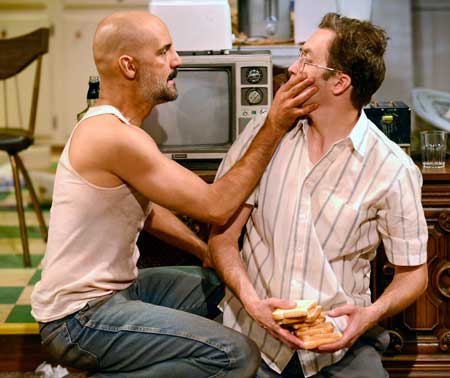Play (1983)
by Sam Shepard
Directed by Joe Short
Gloucester Stage Company
Gloucester, MA
August 17 – September 8, 2018
Scenic Design: Jon Savage; Lighting Design: Marcella Barbeau; Sound Design: David Reiffel
With Nael Nacer (Lee), Alexander Platt (Austin), Mark Cohen (Saul), Marya Lowry (Mom)

Alexander Platt as Austin
in “True West”
Photo: Courtesy of Gloucester Stage Company
Austin (Alexander Platt) is a successful writer trying his best to work a script deal with Saul (Mark Cohen), a big Hollywood producer. He’s staying at his mother’s house in the periphery of Los Angeles, dutifully at work, when he is happened upon by his errant brother, Lee (Nael Nacer). Not one to let his buttoned-down brother get the upper hand, Lee rides Austin mercilessly. When the time comes for Saul to appear, Lee does his damnedest to upstage Austin. A golf outing involving Lee and Saul delivers difficult consequences for Austin, who begins, at that point, to buckle under Lee’s influence. The rest is a psychological joyride all the way down.
The expansive landscape of the Western United States, and the mythology of its submission to colonial expansionism in cinematic Westerns, sets the ironic subtext for this closely framed portrait of two brothers pitched at one another’s throats. The intimacy of the Gloucester Stage theater, and the wonderful realization of the small dwelling (by set designer Jon Savage) in which these brothers thrust and parry, provides the perfect focused condensation of that grandiose vision; within that small, densely crafted space the equivalent of nuclear fission occurs.
Director Joe Short has given artful guidance to his cast which has produced an interesting balance on its four tippy corners, mediated, of course, by the pitched death-struggle between the two iconically opposed siblings.
Alexander Platt gives an appropriately contained rendition of Austin particularly at the outset where the script explicitly indicates that kind of constraint. But even in the wake of his own decomposition he retains a kind of containment. This is an interesting departure from other productions of the play which depict Austin going entirely off the rails entirely as Lee works his infernal magic on him. Here, Platt remains an Apollo in Dionysiac guise, a man overrun but not entirely broken, which gives an added dimension to the play’s subtext. In this reading, Austin is not subverted and transformed by Lee, but thrust in extremis while desperately trying to maintain a grip on his own reality. That reading gives a powerful sense of an eternal duel, a touchstone of a pitched American tragedy that rises here to symbolic distinction.
Nael Nacer, one of the Boston area’s most versatile and compelling actors, on the other hand, brings home a Lee who devours life, and Austin, with no constraint whatsoever. This casting is indeed interesting because Nacer is frequently called upon to play roles that exhibit decency and decorum. Supremely capable of delivering a sense of graceful self-possession, Nacer often inhabits roles (like that of the noble cloth merchant in the Lyric Stage’s 2015 production of Intimate Apparel) that hold down the lovably responsible end of things.
In the extremely compelling Gloucester Stage production of Annie Baker’s The Flick in 2015, Nacer had a chance to show some of his existential stuff as Sam, the moody, aging, love-punished, and overwrought lifer in a small movie theater, and that performance set the stage beautifully for his rendition of Lee in this production. In The Flick Nacer had the chance to be grim and tragic; here, he gets the opportunity to be exuberantly destructive.
And he does so with abandon, punishing a typewriter with a golf club and punishing his brother with everything else. He seethes and reverberates and one no longer knows whether it is a life-force or a death-force that drives him.
That seems to be part of Shepard’s genius here and what will probably enable this play to continue to be regarded as an American classic. There are no pat answers, no simple moral evaluations, merely an observation of the chemistry of measured restraint and wild energetic abandon frolicking against one another within the frame of the modern frontier.
This timely reflection oF the current political scene which has brought wildness and abandon to national politics, demonstrates, in Lee’s response to Austin, how the balanced approach can lose out to the extreme, cathartically-satisfying, one. This topical, poetically distilled, encapsulation of a distinctively American form of social tragedy hits where it hurts.
The supporting cast – Mark Cohen as Saul, the power-broker, and Marya Lowry as Mom – gives fine additional color to this deft production. Cohen’s Saul is appropriately smooth and complicit with Lee. Lowry’s insensate Mom is perfectly indicative of the background that provides nothing – no judgment, no support, no perspective – a vacancy which, like the bland icon of that broad cowboy landscape, allows and almost encourages anything to happen.
That, at the end, Austin and Lee wind up in the death struggle, pitted against one another much like Cain and Abel, is no mistake. True West has biblical force and the intimately condensed and explosive production given here delivers that message beautifully.
Along with the sets by Jon Savage, lighting design by Marcella Barbeau and sound design by David Reiffel, are expertly and effectively done.
– BADMan
Leave a Reply